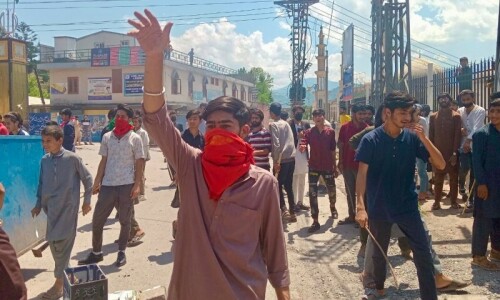AMIDST a prolonged lull after months of political storms, a blockbuster Supreme Court case promises respite to those weary of the daily drudgery. Hearings commenced yesterday on a set of four petitions challenging the trial of ordinary civilians in military courts.
As has become custom, however, the court found it difficult to even begin without running into controversy. Shortly after the nine SC justices originally nominated by Chief Justice Umar Ata Bandial to hear the petitions convened on Thursday afternoon, senior puisne judge Justice Qazi Faez Isa excused himself, saying he could not consider the bench to have been ‘legally’ formed due to the pendency of a petition concerning the Supreme Court (Practices and Procedures) Act, which limits the chief justice’s powers to constitute benches.
The bench was quickly reconstituted after excluding Justices Isa and Tariq Masood, the latter of whom had concurred with the former on the ‘legality’ of the bench. Fortunately, no other judge, petitioner or defendant objected to the new bench despite being offered a chance to do so, and one may now expect the hearings to proceed unhindered.
The matter before the court is undoubtedly of grave national import. It concerns the fate of dozens, if not hundreds, of citizens who face court martial over their alleged involvement in the vandalism of several military properties during riots that broke out following PTI chairman Imran Khan’s arrest last month.
The petitioners include notable lawyers like Aitzaz Ahsan and Latif Khosa, as well as former chief justice Jawwad S. Khawaja, whose involvement is a first by any retired chief justice in Pakistan’s judicial history.
They have presented more or less similar arguments: that the trial of civilians by military courts violates the constitutional rights guaranteed to the citizens of Pakistan and that, in any case, civilians should not be tried under the Army Act when ordinary courts are open and functioning.
It is noteworthy that the petitioners are not seeking any legal relief for the suspects: simply that they be tried in ordinary courts instead of military ones. It will be interesting to hear the counter-arguments from the attorney general of Pakistan, who will be defending the armed forces’ demand, endorsed by the government, that all suspects be court-martialled.
The SC has said it intends to keep its hearings short and wrap up the case as soon as possible. The matter may well prove a watershed for Pakistan’s judicial history.
At hand is the question of what jurisdiction military laws and courts have within the Pakistani legal and judicial system. For years, the lines have been blurred, leading to some grave miscarriages of justice. With the country going through a transformative period, now may be a good time to set fixed boundaries. May the law prevail.
Published in Dawn, June 23rd, 2023










































Dear visitor, the comments section is undergoing an overhaul and will return soon.